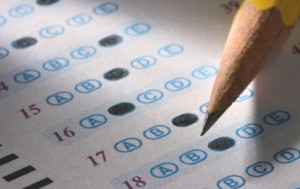An Open Letter to Teacher Coach
Next week the middle school students at my son’s school will be taking the PARCC. He will not be one of them. He will be sitting for two hours in the auditorium with a book and possibly a folder of some work he needs to make up from this marking period if he takes the initiative to collect it. I have officially ‘refused’ the PARCC.
This is our first year in middle school and so far, it has been a wonderful experience. The teachers are committed to student success. They are quick to respond to any questions or concerns I have and work with my son to help him make the transition from elementary school. He has been more excited about his classes than he ever was in elementary school. My journey to this decision was not an easy one. Like many of my friends, I began the year with the intent to have my son test, despite his pleas for me to ‘get him out of this’. He actually tends to enjoy standardized testing and doesn’t get anxious about the scores or grades.
However, as I began to read more about the PARCC and follow the debate, I became less willing to quietly sit by and let the drive for standardization eclipse the incredible creativity and dedicated teaching that makes my son’s school so special. A grass-roots movement of families interested in refusing the PARCC has led to spirited and mostly respectful discussions amongst my parent friends and I am grateful to for the questions being raised by friends who will be allowing their children to test next week, as they help me consider my decision to refuse.
They wouldn’t be using this test if it wasn’t a good measurement.
The lack of transparency about the creation and intended scoring and use of this test has been a concern of mine. Fewer than half of the original 24 states originally signed up for PARCC are still planning to use it. These states have dropped out citing serious concerns about the test. The development and implementation of this test has been funded by technology and testing companies, not educators and there has been no study of test validity (how well the test measures what it says it measures) for this test. States are paying, and paying big, to be the test group for PARCC.
Critics of the format of the test cite problems with the question format and complexity of the test. Specifically, some researchers have found that the Lexile measure of the test questions is 2 grade levels above the grade Lexile levels, leading some to argue that the test is deliberately intended to show failure.
I took those tests as a kid. They weren’t that disruptive.
This is not your mother’s Iowa Basic Skills class. I remember coloring in those oval bubbles too. The only ‘test prep’ we had back then was to eat a good breakfast and get a good night’s sleep. And the test was not given to every grade, every year.
While the reported ‘total in-chair time’ for taking the PARCC is estimated at 13-15 hours (longer than it takes to complete the bar exam!), schools are commonly referring to the test taking season lasting from March through June. At my child’s school, the test will span only 5 days but since we share the library with the high school, it will be closed for two full weeks and the block schedule which has allowed for extended time for hands-on projects and in-depth exploration of content, has been condensed for 5 weeks to allow for time to train the children in how to take the test and for the actual administration of it. During these five weeks, each class is only 30 minutes long.
Districts are reporting less of a focus on subjects not tested by PARCC. At one local meeting, a science teacher told parents that her administrator told her to stop teaching science and teach math that would be on the test, and to then use the math grades as those for her science course.
Finally, I believe the test is financially disruptive. While schools have fired nurses, principals and school counselors, and teachers are paying out of pocket for basic supplies for their students, billions of dollars have been spent on these tests, and that’s not counting the money spent on computers required to take the test. That is money I feel could better be spent on resources and staffing and services.
Teachers need to know how kids are doing. I have a right to know if my child is learning.
Absolutely. And I know teachers don’t always have the time or perhaps the resources or knowledge to fully assess every student’s ability or progress. However, the information that will be returned to teachers, if it is even returned to the teachers before the end of the school year, is not broken down in a way that provides them with diagnostic or instructional information. Teachers, students nor their families will be allowed to see the tests to find out what students got wrong or why. And yet, the results will inevitably be used to determine teacher and school effectiveness.
I will also say that every teacher I have contacted about my son’s progress since the fourth grade has been able to show me examples of his work and clearly communicate to me where he excels and where he is struggling in meaningful ways that allow me to partner with them and help him improve his grades.
An act of civil disobedience.
I understand my fellow parents’ concerns. There is fear that children who do not take the test will be penalized. Some parents have resigned themselves to the fact that this test will eventually be required for high school graduation so they might as well let the kids get used to taking them as early as possible. Others feel they need to teach their children to follow state mandates. These were all things I considered before sending in my letter of refusal.
Legally, it is the schools who are required to administer the exam in my state. Children are not legally mandated to take it. This is an important distinction I shared with my son when I explained he would not be testing with his classmates. Additionally, I wanted him to understand that standardization of education does not accommodate differences in student ability, interests or experience. My child would be fine taking a test. My child’s in-school education is also supplemented by classes and extra-curricular activities I can afford to enroll him in, experiences that no doubt contribute to his ability to master information and perform better on tests. This is not true for all students and I believe high-stakes testing deliberately undermines and punishes under-resourced areas and disproportionately affects students of color and students with special needs.
I don’t imagine that my refusal is going to do much to change the test and standardization climate in this country and I’m not terribly optimistic that the PARCC will go away. But the attention it is drawing is bringing people together to focus on education in this country, and for that I am glad. I have been fortunate that my son has had a series of dedicated, interested teachers who seem to still love the art of teaching and I hope that my small act of refusal sends the message to them and my state that I deeply value and appreciate what they bring to school every day.

Sources for this opinion piece:
http://dianeravitch.net/2014/11/30/bob-shepherd-why-parcc-testing-is-meaningless-and-useless/
http://www.saveourschoolsnj.org/2014/12/23/the-12-reasons-we-oppose-the-parcc-test/
http://www.thedailyjournal.com/story/opinion/2014/08/31/parcc-tests-looming-danger/14917409/
http://njea.org/news-and-publications/njea-review/january-2014/parcc
http://truthinamericaneducation.com/common-core-assessments/the-parcc-test-is-neither-valid-nor-reliable-as-a-measure/
http://unitedoptout.com/
 There are an estimated 3.12 million teachers employed in US public school. How is it that this collective voice has not been leveraged to demand that candidates address issues central to the support and development of a robust education system in our country? Capitalizing on fear and threats is nothing new to the political landscape. We are wired to attend to what we perceive as threats and candidates are hoping their promises to alleviate imminent danger will drive us to the polls. Fear-driven and angry rhetoric stimulates the emergency system of our brains and can lead us to minimize issues that are important but don’t feel as imminent.
There are an estimated 3.12 million teachers employed in US public school. How is it that this collective voice has not been leveraged to demand that candidates address issues central to the support and development of a robust education system in our country? Capitalizing on fear and threats is nothing new to the political landscape. We are wired to attend to what we perceive as threats and candidates are hoping their promises to alleviate imminent danger will drive us to the polls. Fear-driven and angry rhetoric stimulates the emergency system of our brains and can lead us to minimize issues that are important but don’t feel as imminent.


